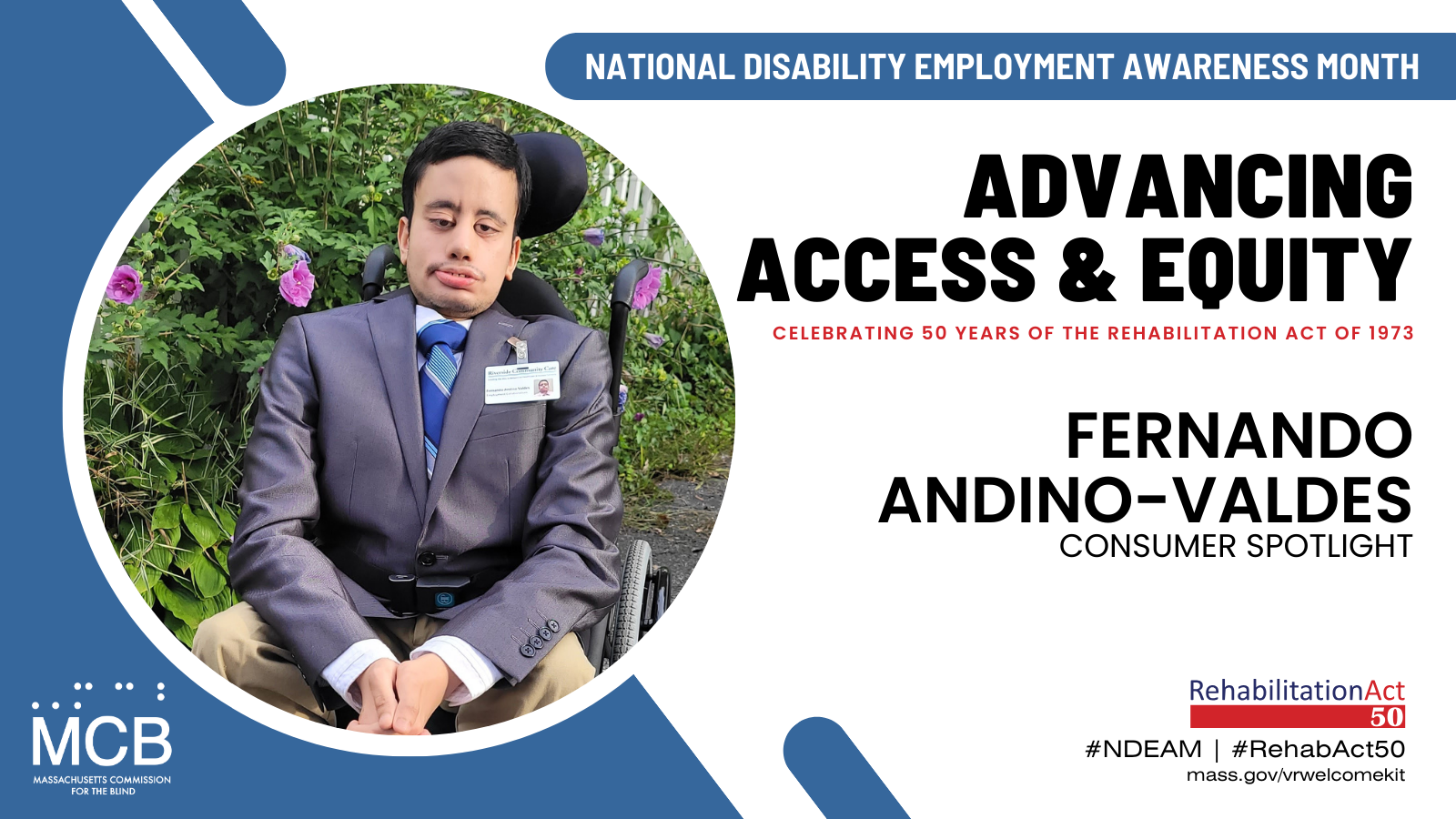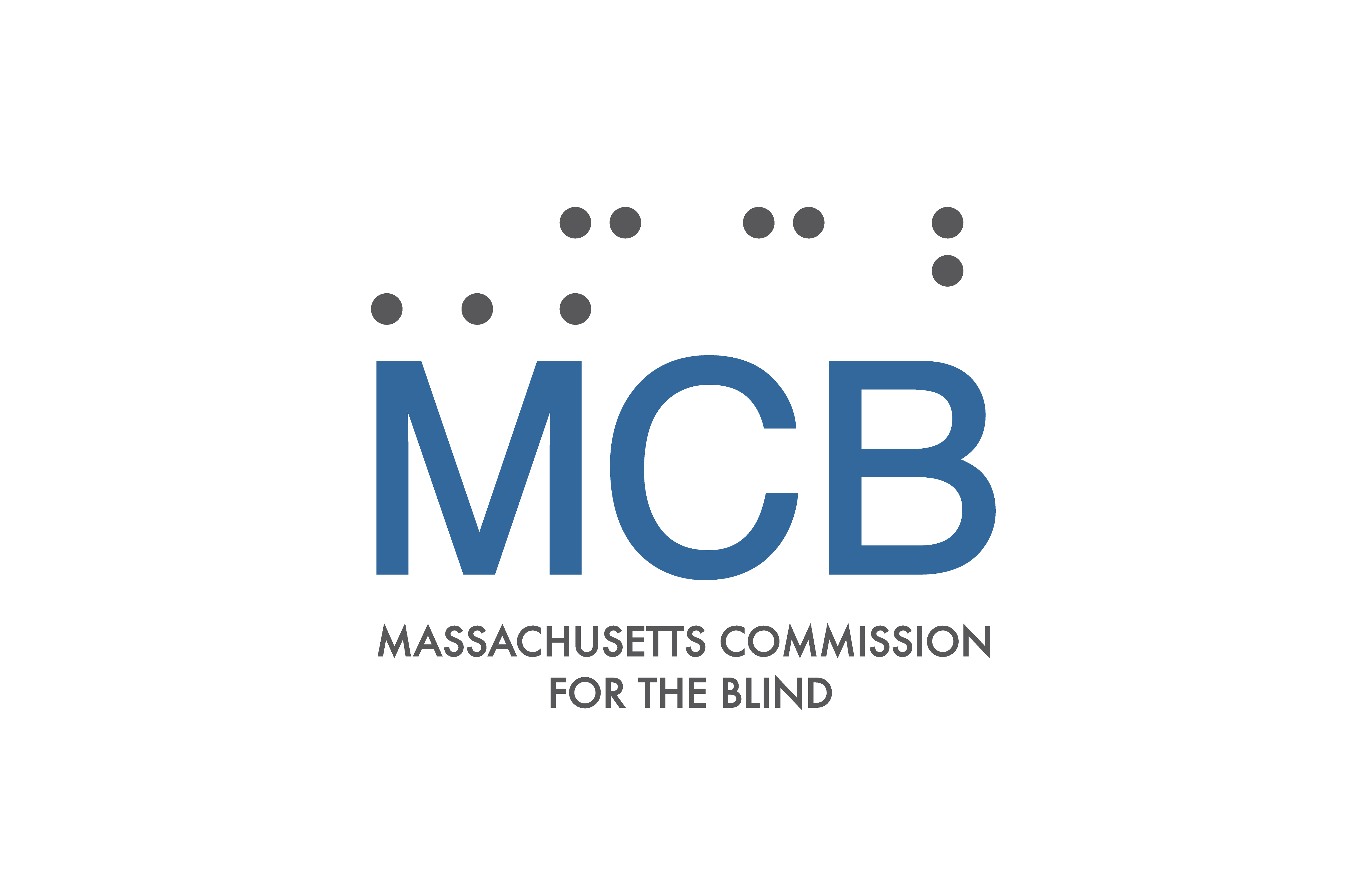- Massachusetts Commission for the Blind

Tell us a little bit about yourself.
I live in the MetroWest region of the state. I earned a bachelor’s degree in social psychology from UMass Boston and currently work as an administrative assistant for Riverside Community Care’s Employment Collaboratives. I enjoy working for an agency that's goal to increase employment opportunities for people with disabilities.
What is your personal connection to the blindness community?
I was born with Moebius syndrome, among other disabilities. One of the notable characteristics of Moebius syndrome is facial paralysis. My facial paralysis prevents me from blinking like most people and because I cannot blink, especially when I’m sleeping, there is an expectation that my vision will deteriorate over time due to my cornea being dry and scratched. Because of this medical deduction, I was diagnosed as legally blind at birth. I would describe my vision as nearsighted, but functional.
I experimented with a lot of accommodations in public school including books on tape, enlarged print, braille, and having an aide in the classroom. As I got older, my preference was to make do with as few accommodations as possible. With the advancement of computers and accessibility features built into popular software programs, this became easier to achieve. In college, I asked for two accommodations in classes: preferred seating to sit in the front row and the ability to record lectures. That being said, I also used reading glasses to help me see the whiteboard and a monocular to view signs.
How has MCB's Vocational Rehabilitation Program helped you?
MCB has always been helpful throughout my years in public school, though I would only realize it as an adult. Most of the accommodations, such as books on tape, books in braille, and enlarged print books, were probably provided by MCB or an MCB partner and then delivered to my public school. MCB’s Vocational Rehabilitation Program specifically helped pay for my higher education and reimbursed me for the costs of school supplies and books. Throughout my studies, MCB Vocational Rehabilitation counselors provided accommodation advice and support to help me navigate some bureaucratic resistance. Additionally, the program provided some independent living classes and mobility training at The Carroll Center for the Blind. After this training, I was provided with a monocular and filtered sunglasses, which I still use. MCB’s Summer Internship Program, part of its Vocational Rehabilitation Program, helped me secure two internships. I interned at the Institute for Human Centered Design and at Riverside Community Care’s Greater Boston Employment Collaborative. Lastly, Carol Cullins, the Employment Services Supervisor at MCB, was instrumental at helping me get my first job at Riverside Community Care.
What is your current job?
I’m an administrative assistant at Riverside Community Care’s Employment Collaboratives. Riverside’s Employment Collaboratives (RECs) provide support for job seekers and job developers throughout most of Massachusetts by partnering with workforce development agencies. They aggregate and provide job leads, trainings, networking meetings, mock interviews, and much more. As an administrative assistant, I distribute the Weekly Employment Results Survey (WERS) every week and manage the data reported for the Greater Boston Employment Collaborative (GBEC) and Northeastern Employment Collaborative (NEEC). I collect, clean, and share GBEC and NEEC’s data on both a weekly and quarterly basis with my director and assistant director. In addition to managing all of the employment data for two collaboratives, I also scrape employer partner career webpages for new job leads and post them on Basecamp, our primary communication platform for job developers in our network. Apart from this, I also tackle any other clerical tasks that need to be done in the week, such as help with job developer network meetings, update information for the RECs, and recently, serve as the onboarding ambassador for our new team member.
Do you use assistive technology to help you complete tasks at work?
I do not use assistive technology to help me complete tasks at work, however, I do take full advantage of accessibility features available to me built into the software I use daily. The two features I use the most are Zoom on MS Office and Dark Mode on Basecamp, but I also adjust the brightness on the monitor as well. Admittedly, many of the accessibility challenges for me specifically are absent in my current job because I work remotely from home.
If you come across an obstacle at work, how do you approach the situation?
The first thing I do when I encounter an obstacle at work is assess the severity of the obstacle and estimate how much time I have to resolve it. If I assess the obstacle is too severe and beyond my skills to resolve or I cannot resolve it in a reasonable amount of time, I will delegate the task to someone well equipped to help me resolve it quickly. More often than not, however, I assess that I can resolve the obstacle, but every obstacle is different. I can solve most software and technological obstacles through critical thinking and Google searches. When I encounter conflict in the workplace that is more complicated to navigate, I have found that leading with positivity and empathy, practicing active listening, and investing time in clear communication goes a long way. It has also served me well to not be easily offended. While I am confident in my abilities, I also practice humility as there are still many opportunities for me to learn new things.
Do you have any advice for people who are adjusting to life with vision loss?
My advice for people adjusting to life with vision loss is to prepare as much as possible and take advantage of all the services MCB and The Caroll Center for the Blind have to offer. For me, I also find it helpful to speak with a mental health counselor. I think this can be very beneficial and it just adds another layer of support. Vocationally, I would suggest learning a skill set that cannot be replaced by artificial intelligence and that you enjoy. If you’re tech savvy, maybe practice incorporating artificial intelligence tools into your work. I would also say working from home is a huge advantage that should be considered by everyone, but especially people with disabilities who face transportation challenges. Additionally, never underestimate the power of networking, especially if you have a knack for it, use it! Talk to everyone, be sociable, get on LinkedIn, attend events, and intern and volunteer as much as you can.
What do you enjoy outside of work?
I enjoy reading, watching Netflix, and listening to podcasts.
Complete this sentence: "I wish that everybody knew..."
I wish that everybody knew there is hope for people living with severe disabilities in Massachusetts. There are people working every week trying to improve the lives of people with disabilities and I’m proud to count myself among them. I know firsthand how empowering it is to have a meaningful job that not just earns me a paycheck, but also serves my community and supports my professional development. My mental health and quality of life have vastly improved as I now see potential for a more independent future. I really hope anyone with a disability reading this strongly considers taking advantage of employment services offered by MCB and other agencies, especially now that we can have ABLE accounts to save money and not lose our healthcare, there is nothing to lose in trying.
